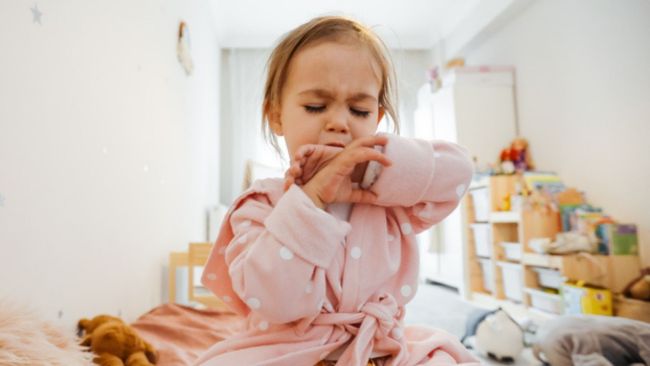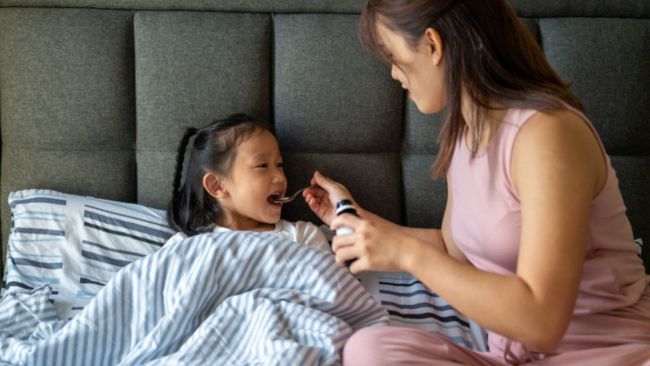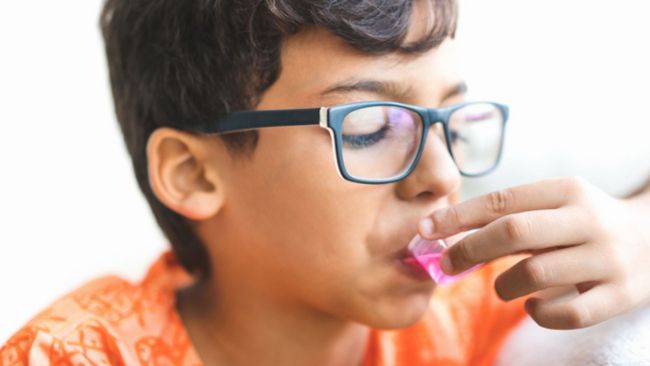Dr Sam Hay explains the use of cough mixtures in children
"For the majority of kids, coughs will clear up on their own regardless of what you do. But there are a number of safe remedies that just might make a difference," Dr Sam explains.
Coughs: there are niggly dry ones, wet junky ones, annoying tickly ones, sporadic rib breaking ones, and every version in between! They pop up on their own or come hand in hand with a head cold. They last for a couple of days, or weeks, or months…. (Damn it!)
With life returning to ‘normal’ after COVID, Aussie families are getting smashed with colds and flus - and that means there is LOTS of coughing going on in every household.
So it’s no surprise desperate parents are reaching for any potion they can find to help soothe a cough for their kids, and maybe help them get better that little bit faster so they can get back to work - and get some sleep!
Dr Sam answers the big questions about cough mixtures. Do they actually work, and are they safe?
Want to join the family? Sign up to our Kidspot newsletter for more stories like this.

RELATED: Dr Sam answers questions about COVID vaccine for kids
What causes a cough?
A cough is a natural reflex to some sort of irritation in the airways. Snot, inflammation, infection, or an inhaled piece of plastic irritate the lining, triggering a massive muscular contraction - your body’s way of trying to get rid of the issue. The problem is, unless it’s that piece of plastic which gets coughed out, the irritation continues, until the cause - usually an infection - is cured.
Coughs can be ‘wet’ or ‘dry’, which really just refers to how much mucous is hanging around.
The most important task is to work out what’s causing the cough, so if your kids have an ongoing cough, especially with breathing problems or a fever, then you’ll need a check up with your doctor to work it out. But don’t worry, you’re not alone - cough is the most common symptom leading to a trip to the doctor for kids.
Fast fact: COVID TESTS ARE STILL NECESSARY! Any cough needs to be treated as COVID19 until it’s ruled out. Most GPs will ask for a negative RAT or PCR before seeing you.
Cough management
The management of a cough will largely depend on what the cause is. Cough mixtures are really only ever intended to be used to sooth a cough for kids who are ‘mildly’ unwell. ‘Really’ sick kids, those with shortness of breath, high fevers, or real listlessness need close attention and specific therapy for the underlying issue.
● Upper Respiratory Tract Infections. The common cold, COVID, or influenza all have a cough as a major symptom. The infection itself irritates the airways, or all the mucous (snot) builds up: both triggering a cough. You’d usually see runny noses, sore throats, and blocked ears as well.
● Pneumonia. Infections of the lower respiratory tract will also cause a cough, which can be serious, so must be considered for kids who are going downhill with fever and shortness of breath.
● Post Nasal Drip. Allergic rhinitis (‘hay fever’), enlarged adenoids, and the annoying post-infection phase can all lead to chronic low grade mucous production. The mucous literally drips down from the back of the nose leading to a niggly cough.
● Whooping Cough. Pertussis infection comes with classic bouts of coughing followed by a big inspiratory ‘whoop’.
● Asthma. Asthma causes more than just a wheeze. Often sufferers have a dry niggly cough at night.
● Post-infective cough. Many kids suffer a cough that just seems to go on, and on, and on after the cold clears up. This is usually a combination of post nasal drip and lingering irritation to the airways.
● Reflux. Any association with feeding or positioning may indicate some food or acid reflux bubbling over and irritating the airways.
● Cold or polluted air. Cold air, smoke, dust, and heavy pollution will all irritate the airways leading to a cough.

RELATED: Dr Sam on treating your child’s dry, itchy skin
What’s in cough mixtures?
Not all cough mixtures are pure cough suppressants - called antitussives. They contain a variety of medications, each with different actions which may help soothe the cough or help settle other symptoms that come along with a cold.
Most cough mixtures have a combination of:
● Antitussives - drugs that act on the brain to suppress a cough
● Antihistamines - numerous actions including sedation and reducing muscle spasms.
● Decongestants - dry up excess mucous production.
● Expectorants - promote the expulsion of mucous from the airways.
● Mucolytics - thin out mucous making it easier to cough up.
● Analgesics - some also contain paracetamol which can help with aches and pains.

Do cough mixtures actually work?
I’m sorry to say parents, but the evidence says no.
There’s very little evidence from medical studies that supports any of the medications in cough mixtures being useful to fight off infections or relieve symptoms of cough and colds.
In fact, they’ve been shown to have dangerous side effects including significant sedation, nausea, vomiting, abdominal pain, insomnia, and even hallucinations! These can occur even if they’ve been administered correctly - because young kids are all different, and some don’t metabolise drugs well, leading to problems.
Another common issue is that desperate parents sometimes use more than one mixture - often unaware they’re also doubling up on the same medications.
These major considerations have led to Australian authorities making some pretty clear directions on the use of cough mixtures in kids.
● Under 6 years: Not to be used. Especially under 2 years.
● Over 6 years: Only after advice from a health professional (and understanding there’s no evidence they actually work).
But I’ve used them with my kids and I swear by them!?!
That’s probably the Placebo effect. Plus, considering most coughs are caused by viral infections, it’s incredibly hard to know whether the cough mixture ‘worked’, or whether their own immune system kicked in and the cough just went away anyway.
Safe remedies for kids
For the majority of kids, coughs will clear up on their own regardless of what you do. But there are a number of safe remedies that just might make a difference.
Fluids. Keep kids drinking! Being well hydrated will ensure all the snot doesn’t dry out, plus it’s vital for the immune system.
Saline. Nasal congestion and post nasal drip can be easily managed with saline drops or sprays. The saline helps to clear the congestion, plus wash the lining of the upper airways - helping it to clear mucous more easily. They’re safe and easy to come by, simply repeat as often as you need to through the day. Some parents swear by the suckers to pull out the mucous - I think they’re just another form of torture for all involved!
Hot steamy showers. Inhaling moist air helps to loosen up stubborn mucous throughout the airways.
Humidifiers. Tricky one in my opinion - where does all that water go? Into your curtains, carpets and bookshelves I reckon!
Fix the bed. Propping kids heads up in bed can help the airways drain and clear excess mucous.
Vapour rubs. These have been around for hundreds of years, and usually contain ingredients such as menthol, camphor, or eucalyptus oils. There’s little evidence they actually work on curing symptoms, rather, they trick your brain into thinking you’re breathing better! Many parents swear by them, and they’re safe to use - so long as they don’t cause any skin reactions. Just don’t bother rubbing it on your child’s feet…
Honey. It’s simple, safe, and cheap; with some good evidence that it reduces the severity and duration of cough in kids. 1-2 teaspoons before bedtime is the standard dose, and any type could be used. There are recommendations that it should be avoided in kids under 12 months due to the risk, albeit rare, of botulism, which causes muscle weakness.
I get it, times are tough. The last thing we need right now is a suffering child and sleepless nights. The desire to find an easy fix for a cough is strong, but there’s just no magic potion. Cough mixtures are rarely effective and have been associated with risks. Trust the simple safe remedies, and if issues seem to persist - see your doctor.
More Coverage
Originally published as Dr Sam Hay explains the use of cough mixtures in children





